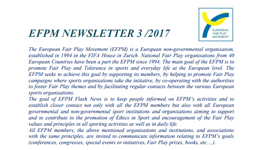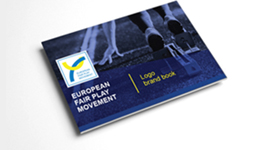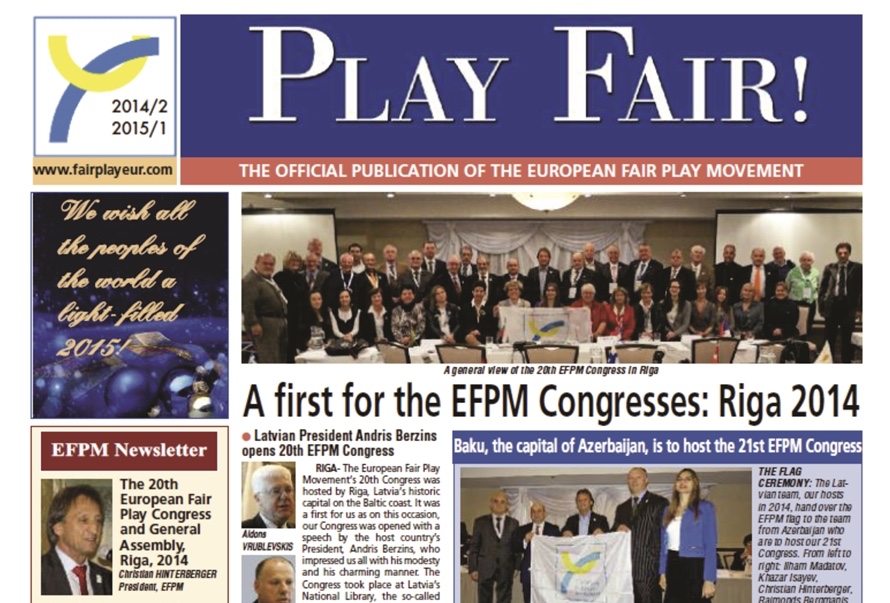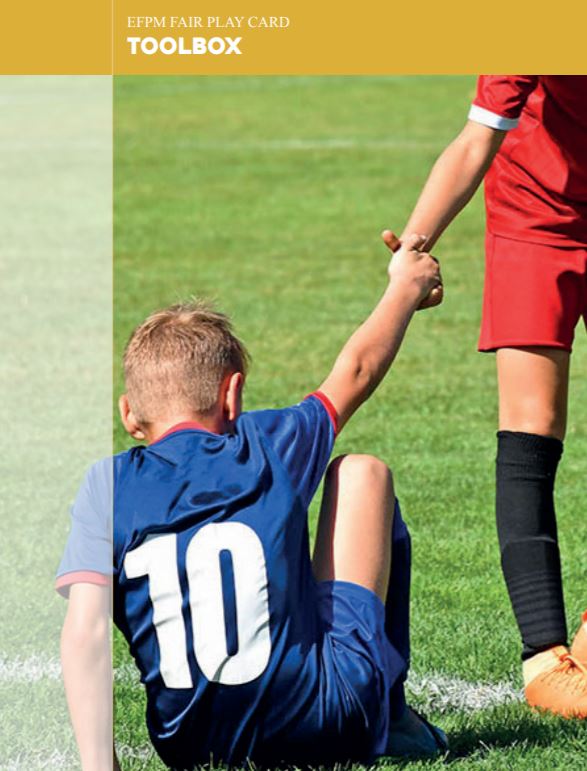Declarations
23rd EUROPEAN FAIR PLAY CONGRESS, Haifa (ISR), 2017
THE 23d EUROPEAN FAIR PLAY CONGRESS, HAIFA 26 OCT. 2017
EFPM DECLARATION
The XXIII European Fair Play Congress held in Haifa on October 24-25, 2017 and attended by 110 representatives from 25 European National Olympic Committees and Fair Play organizations, discussed the topic “Sports as a Tool for Reconciliation”.
Bearing in mind
- The important role of sports as an effective tool for conflict resolution, reconciliation and peace-building;
- The importance of sharing mutual experiences through sport activities, where fair play values are implemented to build trust, respect and mutual understanding;
- The importance of applying the theories and models of peace-building in practice through grass-root projects, particularly among youth with the aim of creating a ripple-effect to parents, the local community, and eventually to governance;
- The important role of the EFPM in promoting Fair Play curriculum and the education of Physical Education teachers and coaches involved in sports activity programs and projects for peace-building;
- The importance of researching and collecting quantitative and qualitative data on the effects and outcomes of peace-building sports programs;
- The importance of building mechanisms to observe, monitor and sustain peace-building projects so that their effects will be long-lasting;
- The importance of integrity and ethics in sports at an individual, organizational and institutional level;
- The importance of constructing codes of ethics and mechanisms to uphold then once established.
The EFPM calls on our members, partners and all sports organizations to invest in the above mentioned themes. To make this practical and deliverable, we ask the following:
- The EFPM Members initiate and/or support peace-building sports projects, particularly for children in areas of conflict.
- The EFPM Members involved in peace-building sports projects collect quantitative and qualitative data and evaluate the effects of such programs
- The EFPM Members evaluate and research the effects of peace-building sports projects based on fair play values, in order to identify success factors and improve unsuccessful ones.
- The EFPM Members promote and take part in building codes of ethics in sports organizations in which they are involved.
21st EUROPEAN FAIR PLAY CONGRESS, Baku (AZE), 2015
EFPM Declaration
The XXI European Fair Play Congress held in Baku, on October 07 – 11, and attended by representatives from 25 European national Fair Play Organizations, discussed the topic “Fair Play in Compettive Sports – Making it Real or just an Ideal?”.
Bearing in mind
- The importance of effective governance to ensure transparency, and honesty in order to ensure fair play is secure within sports organizations
- The importance of informed, and ethical values based education for young people in order to cultivate fair play for the future, and prosper them all
- The need to ensure young people take part in a safe secure environment
- that much effort, passion and work is taking place to promote fair play in sport in many fields, particularly in education, but this would be more effective if coordinated better at national level
- the EFPM’s responsibilities on the promotion of the values and principles of Fair Play in all sport activities, since the grassroots till the top level sport
- the important responsibility borne by well-known teams and professional sports stars as role-models, especially for the young people
- that as top level sport becomes ever commercialised, market forces tend to subvert the central principles that underline a good and fair competition and replace it with a quest for what sells and pursuit of success at any cost, representing a threat to sport’s integrity
- that the present economic crisis in Europe is not only a monetary one, but also an ethical one
- the discussions held on the topic, during the Congress and the inherent projects, programmes and suggestions expressed by the participants.
The EFPM calls on our members, partners and all sports organizations to invest in the above mentioned themes. To make this practical and deliverable we ask the following:
- That EFPM signs up to the Sport and Recreation Alliance – Voluntary Code of Good Governance, and asks all partners, affiliated members, and all sports organizations to strive to implement Good Governance. The Code of Good Governance includes the following seven core-principles:
- Integrity: Acting as guardians of the sport, recreation, activity or area.
- Defining and evaluating the role of the board.
- Delivery of vision, mission and purpose.
- Objectivity: Balanced, inclusive and skilled board.
- Standards, systems and controls.
- Accountability and transparency.
- Understanding and engaging with the sporting landscape.
- That EFPM becomes a signatory to the Safe Sport International (SSI) Declaration of Principles, and supports the International Safeguards for Children in Sport, and requests all partners and affiliated members to do the same.
- Ask that the key European Agencies and National Fair Play Committees, promote values based fair play through a coordinated plan.
Baku, October 11th, 2015
20th EUROPEAN FAIR PLAY CONGRESS, Riga, 2014
EFPM Declaration
The XX European Fair Play Congress held in Riga, on October 09 -11, 2014 and attended by representatives from 25 European national Fair Play organisations and 120 participants, discussed the topic “Fair Play values – the bridge between sports and culture in Europe without discriminations”.
Mindful of the social role of the sport activities ensuring respect of the rules, providing everyone with an equal chance of taking part, reflecting the concepts of friendship, respect for others and sportsmanship;
Recognizing the need of fair treatment of athletes with disabilities and the role of the Paralympic Movement in ensuring it for enabling access to the sports facilities to promoting participation and achieving great sporting success;
Being aware of the role that mass media play in the formation of the opinion and behaviour of the general public benefits of physical activities, promoting high level sports as well as the special responsibility of media when reporting on sensitive issues as doping, violence and/or mach fixing;
Admitting the impact which sport infrastructure pose to the environment, from simple football field to motor and aviation sports facilities, which requires careful planning and assessment of needs, especially with regards to major sports events;
Recalling the threats to the sport by corrupted practices that lead to adoption of the Council of Europe’s Convention on the Manipulation of Sports Competitions, and the scope of the commitments that governments will agree to implement by ratifying it;
Concerned that fairness must be ensured in sports labour market by recognizing athletes dual career in sports;
Supporting promotion of Fair Play concept by different target groups, especially youngsters
Thanking the Latvian authorities for the organization of this Conference and for their kind hospitality during it
the participants of the 20th European Fair Play Congress in Riga, Latvia agreed on the following statements and invite: EFPM calls on:
The Governments and other public authorities responsible for sport,
- when deciding on sport policy, to examine whether Fair Play principles had been adhered to;
- to pay special attention to effective planning of the sports infrastructure so that all groups of people have access to them;
- to ensure that top level athletes would have conditions for securing their future by ensuring a strong education or vocational background.
- to improve the implementation of the formal curicula and out – of – school physical education activities, with a view to acquaint the pupils with the principles of Fair Play.
- to ensure that rules and their implementation are in compliance with Fair Play and Good Governance democratic principles directed against manipulation of results, violence and use of doping;
- to actively promote Fair Play concepts by using top level athletes as role models for forming public opinion and especially the young generation.
Mass Media
- to recognize their role in providing accurate and positive information to maintain, promote and develop ethical values of sport.
Formal and non-formal education institutions, National and International Sports Federations, National Olympic and Paralympic Committees, The EFPM is fully available to pay its contribution to the fulfilment of this goal!
Riga, October 11th, 2014
19th EUROPEAN FAIR PLAY CONGRESS, Istanbul (TUR), 2013
EFPM Declaration
Representatives from 23 Members of the European Fair Play Movement, plus 58 other participants, attended the 19th European Fair Play Congress held in Istanbul from 4th to 9th June 2013. The topic for the Congress was ‘The Olympic and Paralympic Movement: An Alliance for Fair Play’.
Bearing in mind:
- that Fair Play is a most desirable attitude for athletes, coaches and managers not only in sporting activities but also in everyday life;
- that Fair Play must be visibly observed in every area related to the Olympics and Paralympics;
- that Fair Play is the principle underlying high quality of life;
- that as increasing numbers of disabled people are now seeing sport as an essential part of their lives, these people must be encouraged to take part in sport and must be given the opportunity to take part in whichever sports they wish;
- that we are engaged in the struggle against doping, violence, cheating, discrimination and racism;
- that we are committed to protecting the health of athletes and to the eradication of doping;
- that we are playing an active role in efforts to combat drug-taking and to explain the dangers involved to athletes;
- that it is our intention to plan new projects and laws designed to combat violence;
- that we believe relations between everyone involved in sport at all levels should be open and friendly – in particular, relations between fans of different teams;
- that we believe equal opportunities for men and women in sport should be guaranteed and safeguarded;
- that we believe coaches and all others working directly with young people in sport should be given an education in Fair Play;
- that we believe an education in Fair Play should be given in primary schools, high schools, universities, sports clubs and sports federations, and also in the armed forces;
- that we need to adapt our message to the needs of younger age groups, and to prepare visuals that will enable younger children to better understand and absorb the spirit of Fair Play;
- that we need to encourage the media to publicise actions taken in the spirit of Fair Play, and to avoid making unfair comments;
It is our belief that in order to achieve all these goals, we need, as a necessary first step, to further enhance our co-operation with sports organisations throughout Europe so that our message can be more widely heard and understood.
18th EUROPEAN FAIR PLAY CONGRESS, Verona (ITA), 2012
EFPM Declaration
The XVIII European Fair Play Congress held in Verona, on October 24-26, and attended by representatives from 25 European national Fair Play organisations and 120 participants, discussed the topic “Professional sports and Fair Play”.
Bearing in mind:
- the EFPM’s responsibilities on the promotion of the values and principles of Fair Play in all sport activities, since the grassroots till the top level sport;
- that sport offers a vast potential to society as a ground for intercultural encounters and understanding, as a workshop for socialisation and integration;
- the important responsibility borne by well-known teams and professional sports stars as role-models, especially for the young people;
- that as top level sport becomes ever commercialised, market forces tend to subvert the central principles that underline a good and fair competition and replace it with a quest for what sells and pursuit of success at any cost, representing a threat to sport’s integrity;
- the recognition that the top level sport has the huge potential to play a positive role in society as a showcase for excellence, achievement and commitment, but that it can only play this positive social role, if it operates within boundaries of sound ethics;
- that to be a sport professional does not mean to take profit in any way, but the fulfilling of a work or a project, about respecting the rules, the law and the human dignity;
- that the present economic crisis in Europe is not only a monetary one, but also an ethical one;
- the discussions held on the topic, during the Congress and the inherent projects, programmes and suggestions expressed by the participants.
The EFPM calls on:
- the Council of Europe and European Union, to establish a continuous policy dialogue on such issues that acquired a global dimension such as: bribery and corruption, trafficking in underage players and players from developing countries, fight against doping, illegal betting, money-laundering through sport;
- to support transnational networks focusing on repressive and preventing measures on the above mentioned issues;
- the Governments, to use their means of investigation and repression necessary to avoid or to clarify eventual cases and to prosecute the offenders responsible for match-fixing, considering that these are often people outside the scope of the sport organisations;
- to support all the activities launched by the sport movement aimed at fighting against racism, xenophobia and related intolerance in sport;
- to work in a close cooperation with the respective national sport movement in the development of projects and campaigns aimed at the implementation of the Fair Play values and principles in all sport activities since the grassroots up to the professional sport, as well as in life in society;
- to cooperate with the sports betting operators on defining the regulatory framework of the sports betting market and taking concrete measures on the fighting against illegal betting operators;the sports movement, to run the professional sport based on the preservation of the human dignity of all the involved ones; on the respect of the ethical values and consequent rejection of the exploitation of man by man;
- to take all available measures to fight against all kind of dangers associated to an excessive sport commercialisation;
- to implement specific programmes and, or, projects aimed at the development of the Olympic values;
- the inter-Governmental sports organisations, the European national governments and the European Sport Movement, to establish a closer cooperation, working in partnership, aiming for a real improvement in the European sports transparency and all profiting of a sharing of tasks.
The EFPM is fully available to pay its contribution to the fulfilment of this goal!
Verona, October 27th, 2012
17th EUROPEAN FAIR PLAY CONGRESS, Porec (CRO), 2011
EFPM Declaration
Representatives from 27 members of the european fair play movement (EFPM) and 140 participants attended the 17th EFPM congress held in porec croatia from 28-29 September 2011 on the topic of “Sport as a part of culture – Fair Play as a part of sport culture”.
Bearing in mind:
- EFPM’s particular responsibilities for promoting the values and principles of Fiar Play in all sports activities and in everyday life throughout Europe,
- The declarations adopted at the 16 previous EFP Congresses, and taking into account:
- The media and the violence in sport
- The sport as an agent of moral change and transfer
- The fair play and the supporters behaviour , and
- The ethical conduct of the sport coaches
The EFPM calls on
- The european national olympic committees to include fair play as a part of sport culture by
- Considering proper ways of promoting Fair Play through the various sports and
- İnvolving top level athletes in this promotion produres (e.g. to communicate their personal experiences and their trust in the basic values of sport).
- The UEPS and other european mass media organizations to strengthen their cooperation with EFPM in order to provoke unacceptable behaviours of athletes, coaches, sport officials and spectators and to fight against the violence and the corruption in sport.
- The educational institutions and the academic society to cooperate with EFPM in order to reinforce and widespread the teaching of fair play ethical values by making a better use of their educational .ypotential and by publising national handbooks and scientific papers about the role of sports as an agent of moral change and transfer.
- The national governmental and non govermental organizations to cooperate with EFPM towards
- the recognition of the role of fair play in sports and everyday life;
- the strengthening of ethical conduct of the sport coaches by issuing an ethic code for coaches in accordance with given european practices;
- the investigation of realistic methods to conduct the spectators behaviour in the framework of fair play values .
- The EFPM Members to develop an action plan for the years 2011-2012 defining the activities to be carried out following their prorities and needs on national level and in accordance with the fair play principles as discussed in this Congress.
16th EUROPEAN FAIR PLAY CONGRESS Prague (CZE), 2010
EFPM Declaration
Representatives from 25 members of the European Fair Play Movement (EFPM) and 120 participants attended the 16th European Fair Play Congress held in Prague from 27 to 29 October 2010 on the topic of “Fair Play Education in Schools: A Shared Responsibility”.
Bearing in mind
- EFPM’s particular responsibilities for promoting the values and principles of Fair Play in all sports activities and in everyday life, throughout Europe,
- the Declarations adopted at the 15 previous European Fair Play Congresses, and taking into account
- the educational values in schools
- the Fair Play apprehension by scholars
- the positive initiatives against racism and ethnic discrimination and
- the influence of the current sports negative symptoms on the Fair Play educational process the EFPM calls on
- the National Governmental Educational Organizations to introduce Olympic Education as a subject of the School curricula or in a cross-curricula perspective.
The Universities and the Faculties of Sports Science and Physical Education to consider
- the Chair of “Ethics in Sport” as of the utmost importance in the Physical Education and Sports Science field.
- that a module of value education in PE and school sports should become compulsory in the PE teachers education.
- focusing a part of their research and educational capacities on current issues concerning Olympism and Fair Play, in cooperation with the National Olympic Studies Centres.
- that the results of research activities in Olympism and Fair Play should be subsequently a predicate of education programmes and systematically developed in University concepts of Olympic and Fair Play education programmes.
The European and National Olympic Committees to
- create and develop specific programmes, aiming to disseminate the Fair Play values and principles, especially among young sports participants
- publish specific bibliography addressed to young sports
Participants, youth sports coaches, parents and sports officials, managers, sponsors, mass media and sports journalists.
- support systematically the university research programmes focused on Olympism and Fair Play principles.
- create Centres of Olympic Education where groups of students from schools, educational institutions and sport clubs are to be invited to attend relevant courses and lectures.
- invite Fair Play Clubs to organise workshops for youth, parents and teachers, coaches focused on FP values and education, using the available publications on these.
- the European Fair Play Movement to propose and coordinate research projects or expert studies which will deal with how the Fair Play principles and attitudes are perceived and educated in the real behavior in sport and outside sport environment, in gender and age perspectives.
The National Olympic Committees to
- finance and publish Olympic textbooks for children and youth, in cooperation with the National Governmental Educational Organisations and – support systems of Olympic Education with a special sub-chapter focusing on Fair Play.
The National Sports Federations to include in the coaches educational programmes a special subject dealing with “Ethics in Sport”, in the scope of the area of Sport Education”.
The Municipalities to support and develop initiatives and programmes mainly addressed to the primary schools and to community sports clubs, aiming to create a climate of cooperation and mutual understanding among all participants.
The National Sports and Tourism Museums to organise expositions, films projections and meetings with young people on Fair Play and Olympic topics.
The Sport Media to create special Olympic editions focusing on various topics such as Fair Play in sports, celebrations of Olympic anniversaries, etc.
10th European Fair Play Congress Bratislava (SVK) - Appeal
Sports does not speak war language
We, the participants of the 10th European Fair Play Congress, representing national Fair Play organisations, hereby call on athletes, coaches, representatives of the mass-media, sports clubs and federations, the organisers of sports events at local, regional, national and international level – simply all members of the sports community who are convinced of the positive role of sport in our world, to join us.
Therefore, we, members of a sport family living by these values, recommend, that:
Teams, athletes, coaches must ban aggressive expressions and war-like language when talking about their opponents. They must be aware of their influence as role models on young generations and society as a whole. Even the most important sports competition must remain a game, with the opponent being a participant in this game, not an enemy. Thus, nobody shall use expressions connected with war. Nobody shall call for the “destruction, killing, or shooting away of enemy”. Everybody shall strive to achieve a fair, tolerant victory, without using terms such as killing, annihilating the opponent. Sport is not war.
The media must make use of their tremendous influence on society to lead the way and ban war-like language from sport. Aware of the need to fully respect the independence and autonomy of the media, we want to insist not to leave any space for the spread of violent ideas, but to emphasise the inherent values of fairness, tolerance and respect in sport. And in case war-like language is used, then only in the sense of condemning it. The press has an educational value, including TV and all other media. These bodies have a major role to play in guiding society toward the right values. Sport isnot war.
Supporters must continue to be proud of their teams, clubs and preferred athletes, without offending the opponent. Without an opponent, there is no match, no game, no competition. Supporters must recognise that the opponent merits at least as much respect and attention as the favourite athlete or team. It is also their role to ban aggression, war-like atmosphere, and hatred from stadiums and sports fields. Sport is not war.
Thus, in a joint effort by all of us, let’s make sport a place for joy, fun, understanding, tolerance and fairness – and do not allow aggression, war and hatred to enter the sports fields and stadiums. This is not respectful towards sport and even less towards the victims of the numerous wars and conflicts around the world.
1st EUROPEAN FAIR PLAY CONGRESS, Istanbul, 1995
EFPM Declaration
Responsibility of the Media
Believing that Fair Play and sportsmanship in sports as well as tolerance and non-violent behavior in societies are important facets of the quality of life, and that the sports media has a vital role in affecting people’s behavior, it is proposed that:
1. The sports media should do its utmost to promote, inform and propagate the concept and understanding of Fair Play and Olympic education in the society and should take a stand against violence, attacks and the attitude behind “winning at all costs.”
2. To reach to final goal, which is sportsmanship, the targets designated for the media, in order for them to be enlightened and to be achieved are stated as follows:
- Players, athletes and sports competitors.
- Spectators and supporters.
- School children, students, their parents and teachers.
- Sports organizers, trainers and coaches.
- Referees and officials.
3. We call upon the members of the media:
- To be involved within the national Fair Play organizations and collaborate with their administrative organs.
- To be objective and impartial.
- To strive to improve themselves in Fair Play principles through better training of themselves.
- To insist on the educational aspects of the traditional and electronic journalism.
- To appreciate the true Fair Play actions of the athletes and sports participants.
- To avoid being involved in the interest conflicts concerning the organization of sports events.
- To avoid the over-emphasizing of corruption, scandals, chauvinism, fanaticism, hooliganism, violence and doping.
- To avoid the propagation of the concept “wining at any cost”.
- To avoid the over-exaggeration of the sports events and incidents those have not yet been justified.





